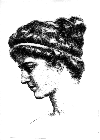

Hypatia of Alexandria is known as the last of the pagan scholar-priestesses. She was born in Alexandria, Egypt, and although her date of birth is a subject of much debate, she died in the year 415 AD. Some people insist that she was sixty when she died, so therefore was born in 355 AD, but others say that she was born in 370 AD. Hypatia is well known as the only woman scholar recorded in the ancient world.
Hypatia was the daughter of Theon, a very well known master of geometry and philosophy, and she lived her whole life in Alexandria. Over the years, Hypatia and her father developed a very strong bond between them, and loved each other dearly. Her father taught her everything he knew, raising her to love and respect education, especially when it came to Plato, a famous Greek philosopher. Theon taught his daughter much about the many religions of the world, especially about Christianity, since she was born into a time when Christianity was beginning to dominate all other religions. While she was still under her father�s discipline, he taught her how to keep her body strong and healthy and ensure a highly functional mind by following a strict physical routine every day. Her father also taught her the fundamentals of teaching, and of public speaking, and so she became an excellent orator and learned to influence people with the power of words. As she grew older, Hypatia began to develop a love of mathematics and the sciences, especially astronomy and astrology. When her father�s teachings could no longer satisfy Hypatia�s passion for knowledge, she went to study things like Diophatine equations and she edited the work �On the Conics of Apollonius.� Many historians believe that, at a young age, Hypatia had already surpassed her father�s great knowledge, but we can never be sure.
Soon, Hypatia became a teacher at the Mouseion in Alexandria, and people came for miles to meet her. Although she was a gorgeous woman who could probably have had any man she wanted, she remained chaste, just, and a virgin. She was so beautiful though, that one of her students fell deeply in love with her, and openly showed her signs of his love. Some say that Hypatia cured his infatuation with the help of music, but others say that she actually showed him some rags from her monthly cycle and said, �This is what you love, young man, and it isn�t beautiful!� He was ashamed and embarrassed, but he went away a better man. As a pastime, Hypatia would put on her philosopher�s cloak and walk through the town, interpreting Plato, Aristotle, and many other famous philosopher�s to those who wished to hear.
As the years passed, Hypatia was known throughout Alexandria, and almost the whole city loved her and seemed to worshipped her. Only the Christian rulers of the city, who had been jealous of her from the beginning, despised her. Then, one day, a Christian bishop, named Cyril, was passing down the street, when he saw a large crowd of people. He asked what was going on, and someone told him that they were standing in front of Hypatia�s house, and that everyone was waiting to greet her. Cyril was so envious and full of hatred that he arranged her death. Soon after, a mob of cruel men, who were not afraid to be severely punished by the Emperor, came and killed Hypatia with oyster shells and broken pieces of pottery. Later, they dragged her body around on the streets, smearing the ground with her blood.
Hypatia�s death is symbolic of the beginning of the dark ages, and of an anti-intellectual and anti-feminist component that entered Christian tradition around that time. Sadly, it is still with us today. Throughout her life, Hypatia was honored almost as a god, and not only wrote books that simplified the learning of mathematics, especially algebra, but made many other important discoveries. She made a machine used to distill water, an instrument for measuring the level of water, a plane astrolabe (for measuring the positions of the stars, planets, and sun), and a graduated brass hydrometer for finding out the exact gravity of a liquid.
Although she may have died long ago, her influence and writings are still with us today. Hypatia of Alexandria was, and indeed still is, an amazing woman.